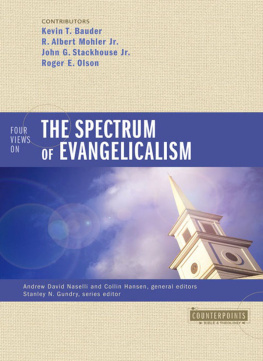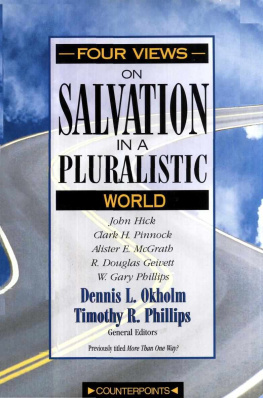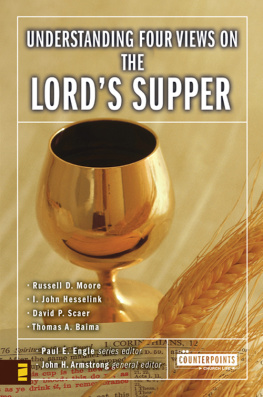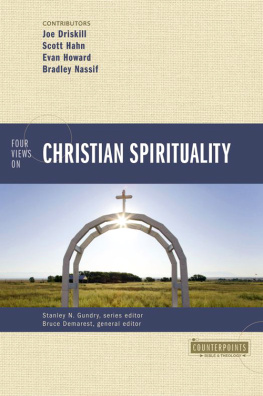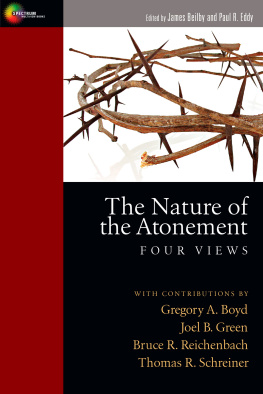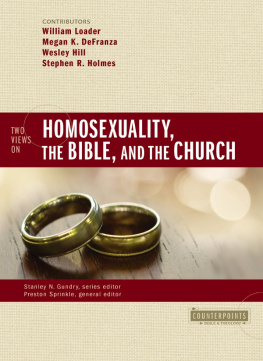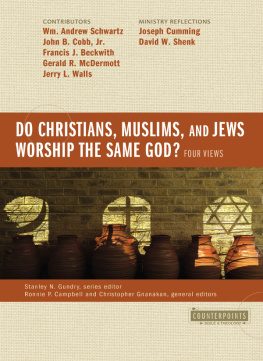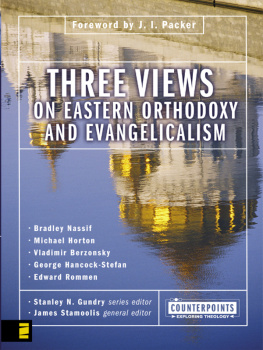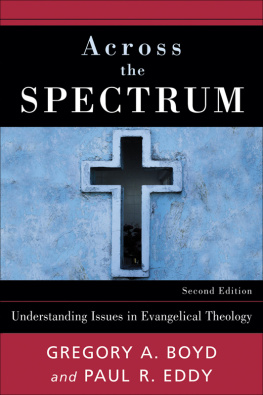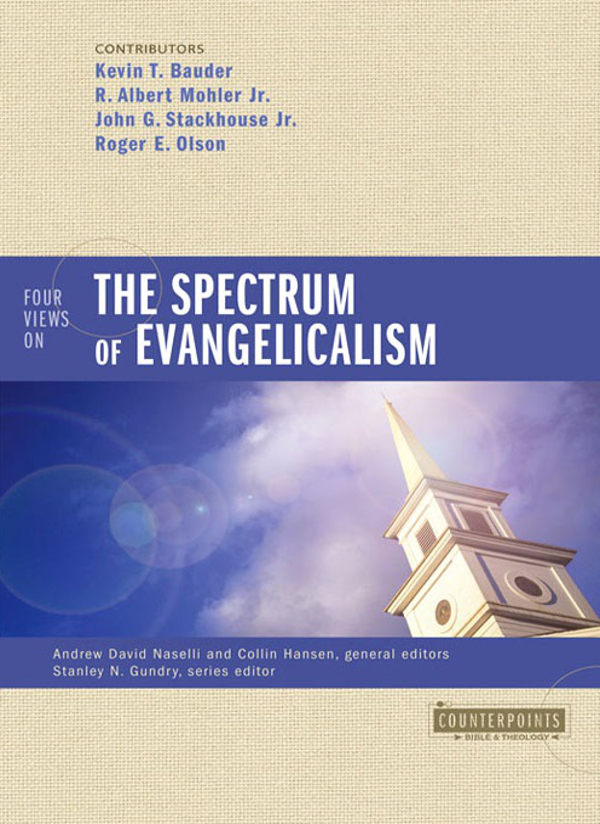Information about External Hyperlinks in this ebook
Please note that footnotes in this ebook may contain hyperlinks to external websites as part of bibliographic citations. These hyperlinks have not been activated by the publisher, who cannot verify the accuracy of these links beyond the date of publication.
CONTENTS
COLLIN HANSEN
A mericans have little trouble identifying an evangelical: that would be someone who stayed loyal to George W. Bush before transferring allegiances to Sarah Palin. Expand your focus group to the rest of North America and Great Britain and the answer may grow somewhat more complicated. Still, evangelicals are most commonly known for advocating the gospel of free markets, strong defense, and traditional morals. Jesus might as well have been Ronald Reagan. To the watching public, evangelicals seem to share the same one view on any given issue. So who needs to publish a whole book trying to describe evangelicals by presenting four views?
We self-described evangelicals often lament such stunted descriptions. Evangelicalism predates the Religious Right and represents a variety of political views, even if many now vote Republican in America. Besides, evangelicals are not so much political activists as ambassadors for the kingdom of heaven, where Jesus Christ reigns and sustains the world. We will gladly explain that an evangelical testifies to the evangel, the good news that the one and only Son of God has come into the world to save sinners. We pass along a message of first importance: that Christ died for our sins according to the Scriptures, that he was buried, that he was raised on the third day according to the Scriptures (1 Cor. 15:34).
Yet all is not so clear within the evangelical camp either. Simply labeling ourselves evangelical no longer suffices. We are conservative, progressive, postconservative, and preprogressive evangelicals. We are traditional, creedal, biblical, pietistic, anticreedal, ecumenical, and fundamentalist. We are followers of Christ and Red Letter Christians. We are everything, so we are nothing. If the descriptor evangelical cannot stand on its own, then it has little use. There is no coherent movement, only an endless collection of self-styled labels created by Christians for their Facebook profiles.
Those of us who work for evangelical institutions often struggle to hold these factions together. Everyone has an opinion about where the movement should head. And everyone wants to offer his or her own special twist on defining evangelicalism. I have found myself simultaneously defending fellow evangelicals from skeptics, seeking to build consensus within the movement, offering my own perspective on key positions we must hold, and defending myself from evangelicals who do not regard me as sufficiently cooperative. Such is life in evangelicalism, which seems to be moving in several directions at once.
At the same time, the energy that threatens to pull evangelicalism apart supplies much-needed dynamism to Christianity in the West. In its history, evangelicalism has prodded the powers as a movement of renewal and revival. Evangelicals have called moribund ministers to theological renewal and called on God to send revival by the power of the Holy Spirit. Whatever their differences, evangelicals pledge allegiance to Christ alone, the only hope for self-absorbed sinners in any age or place, any stage or race. When tempted to leave behind the headaches of this eclectic movement with no leader and no membership, we pause and ask, But where should we go? So long as evangelicals testify to the words of eternal life, we count ourselves among their ranks. At its best, evangelicalism overcomes nonessential differences to unite like-minded Christians around the common cause of gospel proclamation and gospel living. If we lose evangelicalism to political captivity or rampant individualism, we lose a rare opportunity to demonstrate unity and mission outside the local church. We hope this book, then, will serve to shore up evangelicalism by highlighting common beliefs and fostering respectful disagreement where necessary.
Biblical Testimony for the Evangel
Evangelicals take their name from the koine Greek word euangelion, translated into English as good news. The word appears in Scripture with various nuances. But it frequently relates to the coming of Jesus Christ and his ministry to usher in the kingdom of God.
An angel announced to shepherds outside Bethlehem the good news of great joy for all the people. In a message particularly rich in biblical significance for Jews, the angel explained that a Savior was born in the city of David who was Christ the Lord (Luke 2:1011). At the beginning of his ministry in Galilee, Jesus proclaimed the good news of God. The time has come, he said. The kingdom of God has come near. Repent and believe the good news! (Mark 1:15). Reading from Isaiah 61:12 in his hometown Nazareth synagogue, Jesus taught that he had fulfilled the prophets words: The Spirit of the Lord is on me, because he has anointed me to preach good news to the poor. He has sent me to proclaim freedom for the prisoners and recovery of sight for the blind, to set the oppressed free, to proclaim the year of the Lords favor (Luke 4:1819). He reiterated this message to followers of John the Baptist who wanted to know if Jesus was the one who is to come (Luke 7:19). Indeed, Jesus testified that he is the Messiah who accords with prophecies proclaiming the coming of Gods kingdom. He responded, Go back and report to John what you have seen and heard: The blind receive sight, the lame walk, those who have leprosy are cleansed, the deaf hear, the dead are raised, and the good news is proclaimed to the poor (v. 22; cf. Matt. 11:5).
Still today evangelicals bear this good news that Jesus Christ has fulfilled the messianic hopes of Israel, even if his followers did not expect him to submit to crucifixion and rise from the dead on the third day. Indeed, the first disciples eventually understood that these unexpected events only confirmed that the heavenly kingdom had dawned in Jesus. As the world awaits his second coming, we have the responsibility to repent of our sins and believe this good news. Amid much debate, the apostles began taking this good news that Jesus is the Christ to the nations (Acts 5:42). Philip evangelized an Ethiopian eunuch by explaining Isaiah 53:78, which gives particular attention to Jesus crucifixion. He was led like a sheep to the slaughter, and as a lamb before its shearer is silent, so he did not open his mouth (Acts 8:32). The good news is that all who trust in this sacrifice for their sins have peace through Christ, who is Lord of all (Acts 10:36). No longer should we trust in the worthless idols made by human hands. Rather, we may trust in Jesus, who is the exact representation of the living God, who made the heavens and the earth and the sea and everything in them (Acts 14:15). Though unbelievers accuse us of mindless babbling, evangelicals understand that Jesus resurrection is the only sure ground for hope (Acts 17:18). How beautiful are the feet of those who bear this good news, who proclaim peace, who bring good tidings, who proclaim salvation, who say to Zion, Your God reigns! (Rom. 10:15; Isa. 52:7).
Evangelicals take criticism for adopting an essentially negative posture toward what the world regards as progress. It is true that evangelicals will side with Scripture when others bless moral behavior that God condemns. And the good news carries an initial bit of bad news that sin has broken the relationship between God and his creation. But evangelicals bear in their very name a message of the greatest joy imaginable. Though they sin, humans may be reconciled with their perfectly holy, perfectly powerful, perfectly loving Father. Through Jesus Christ, the Father adopts believers into his everlasting family, not based on anything they have done to earn his favor, but purely by his pleasure and will (Eph. 1:5). Wherever you may find them, whatever language they speak, evangelicals will gladly share this good news, the best news ever delivered.

